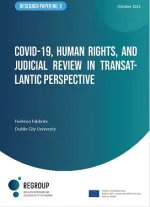Covid-19, human rights, and judicial review in Transatlantic perspective

REGROUP Research Paper No. 5 (November 2023)
The paper examines the protection of human rights during the pandemic in the European Union (EU) and the United States (US) by analysing judicial review of Covid-19 measures. In particular, the paper put together an original dataset of over 300 cases to provide the first ever systematic analysis of how courts in the EU and the US reviewed key Covid-19-related measures, including non facere measures, such as church closures and stay-at-home orders, and facere measures, namely masks and vaccines mandates. The paper advances 3 hypotheses, based on judicial review of emergency measures in counter-terrorism contexts, and tests their applicability during the pandemic by considering a number of cases dealing with freedom of religion, freedom of movement and personal liberty and autonomy. The paper argues that a significant transatlantic convergence exists on how top courts have reviewed non facere measures: in cases reviewing church closures, both in the EU and the US courts have initially deferred to governmental decisions, but tightened their scrutiny over time; and, similarly, in cases reviewing stay-at-home orders, courts have often upheld governmental restrictions but also occasionally invalidated them, particularly when they appeared overblown, or disproportionate.
Instead, the paper points out to a transatlantic divergence in the field of judicial review of facere measures: while EU courts have systematically upheld the legality of mask mandates, and mandatory vaccinations, when these became available, the US Supreme Court has invalidated a general vaccine mandates, and mask mandates have been struck down by state courts. As the paper points out, this divergence can be explained due to the greater politicization of public health in the US than in the EU, and the growing lack of deference towards, and trust in, scientific expertise in the US. In conclusion, the paper suggests that the alternative balancing of human rights and health protection in the US and the EU during Covid-19 reveal contrasting lessons from the pandemic on the relation between risk and resilience in constitutional democracies.